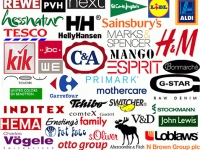Rival Safety Agreements for Bangladesh Garment Factories Announced

Two rival agreements that aim to improve safety in Bangladeshi garment factories were launched this week. The Accord on Fire and Building Safety in Bangladesh's Garment Industry was launched Monday while the Alliance for Bangladesh Worker Safety was launched Wednesday.*
The first is backed by a group of 75 retailers, mostly from Europe and the second is backed by 17 companies led by major U.S. retailers Gap and Walmart. While the first is legally binding and guarantees funds to improve safety conditions, the second is voluntary and limits the liability of the retailers.
European activists singled out Walmart for creating weaker standards. "Walmart are bringing their discount practices to factory safety. This is not a price war; this is about people's lives," Christy Hoffman, deputy general secretary of UNI Global Union, said in a press release. "Walmart has dragged Gap and a number of other brands down the wrong track. We now urge the Walmart/Gap initiative to think again and raise its standards to those of the accord."
The two agreements will affect the jobs of over four million workers in Bangladesh who earn the world's lowest minimum wage - $38 a month. The garment industry generated $20 billion a year for the country last year.
The deals were signed some 11 weeks after Rana Plaza, a building that housed five garment factories, collapsed in Bangladesh on April 24 leaving some 1,129 dead. Clothes destined for Benetton of Italy, Children's Place, Cato Corporation and Walmart from the U.S., Kik from Germany, Loblaw from Canada, Mango and El Corte Inglés from Spain as well as Bon Marche and Primark of the U.K. were found in the rubble.
Union organizers say that one of the major reasons for the poor safety records of Bangladeshi factories is that corrupt government officials tend to look the other way during safety inspections, especially since many senior politicians own garment factories themselves.
The first initiative was originally negotiated and signed in Dhaka in April 2011. At the time it was wildly unpopular. "All of the big brands and factories all walked away without signing the agreement," said Amirul Haque Amin, president of the National Garment Workers Federation in Bangladesh. "It is not financially feasible for the brands to make such investments," Walmart's spokesperson said, according to the meeting minutes.
On Monday 75 companies signed a legally binding version, including Benetton, Carrefour, H&M, Marks and Spencers, Mothercare, Primark, Sainsbury and Tesco. They will have to publish a list of their factories, believed to number over 1,000, by next Monday. Within the nine months, a group of international inspectors will visit all the sites to identify "grave hazards and the need for urgent repairs" and then provide the money for improvements.
A steering committee chaired by the United Nations International Labour Organisation has been created. Six people have been elected to the committee from the Bangladesh Council of Trade Unions, IndustriAll Global Union, UNI Global Union both of which are based in Switzerland as well as three company representatives from Inditex, N.Brown Group and PVH Corporation, the parent company of Calvin Klein and Tommy Hilfiger.
"Our mission is clear: to ensure the safety of all workers in the Bangladesh garment industry," says Jyrki Raina, the general secretary of IndustriAll. "The direct involvement of workers in the factories is key to the success of this program."
The second agreement is a product of the Bipartisan Policy Center in Washington DC which is co-chaired by two former U.S. senators - George Mitchell and Olympia Snowe, both from Maine. Their agreement is voluntary and not legally binding on the 17 companies that signed up that includes JC Penney, Sears and Target in addition to the Gap and Walmart.
The retailers that signed the second agreement will have a year to complete inspections. Under the scheme, companies will pay up to $1 million per factory per year for training and support the creation of "worker participation committees" to deal with complaints. Low interest loans will also be provided to help companies to improve building safety.
The North American agreement also limits how much the retailers can be required to pay in case of problems. Jay Jorgensen, the head of global compliance for Walmart, said that his company could not sign the European accord because it would create "unlimited liabilities."
European activists pointed out that at least three North American companies have signed the first accord despite facing the same legal hurdles. They also note that the new worker committees would be weaker than the unions and more likely to be pressured.
"We sought and received input from a wide range of interested parties, including, among others, the governments of Bangladesh and the United States, fire and safety experts, and worker representatives,"Senator Mitchell said in defense of the North American agreement. "While there were many differences, in interests and on issues, the dominant common theme was the importance, indeed the necessity, of developing and implementing a meaningful plan of action to dramatically improve worker safety in the garment industry in Bangladesh."
The outcome of the rival agreements will be hard to assess down the road, say activists since many factories supply several retailers from both groups so the U.S. group is likely to later take credit for improvements brought about the stronger European accord. "The U.S. is freeloading on our commitment," Ben Vanpeperstraete, the Belgian coordinator for garment workers' rights group Clean Clothes Campaign, told the Wall Street Journal.
* Editor's Note: This article was updated on July 10, 2013.